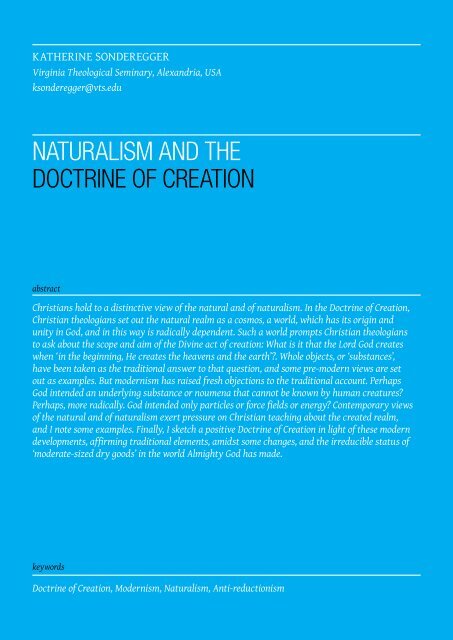A4_PHEN-MIND_n7
A4_PHEN-MIND_n7
A4_PHEN-MIND_n7
You also want an ePaper? Increase the reach of your titles
YUMPU automatically turns print PDFs into web optimized ePapers that Google loves.
Katherine Sonderegger<br />
Virginia Theological Seminary, Alexandria, USA<br />
ksonderegger@vts.edu<br />
Naturalism and the Doctrine of Creation<br />
Naturalism and the<br />
Doctrine of Creation<br />
abstract<br />
Christians hold to a distinctive view of the natural and of naturalism. In the Doctrine of Creation,<br />
Christian theologians set out the natural realm as a cosmos, a world, which has its origin and<br />
unity in God, and in this way is radically dependent. Such a world prompts Christian theologians<br />
to ask about the scope and aim of the Divine act of creation: What is it that the Lord God creates<br />
when ‘in the beginning, He creates the heavens and the earth’. Whole objects, or ‘substances’,<br />
have been taken as the traditional answer to that question, and some pre-modern views are set<br />
out as examples. But modernism has raised fresh objections to the traditional account. Perhaps<br />
God intended an underlying substance or noumena that cannot be known by human creatures<br />
Perhaps, more radically. God intended only particles or force fields or energy Contemporary views<br />
of the natural and of naturalism exert pressure on Christian teaching about the created realm,<br />
and I note some examples. Finally, I sketch a positive Doctrine of Creation in light of these modern<br />
developments, affirming traditional elements, amidst some changes, and the irreducible status of<br />
‘moderate-sized dry goods’ in the world Almighty God has made.<br />
keywords<br />
Doctrine of Creation, Modernism, Naturalism, Anti-reductionism<br />
In a poem of rare mystery and power, the English poet William Blake muses about a creature<br />
enigmatically titled, the Tyger. Brawny and terrible, the Tyger’s ‘fearful symmetry’ is forged in some<br />
terrible, unearthly furnace, sinews and eyes and heart hammered out in the fire of some ‘distant deep’.<br />
Looking back on his delicate Songs of Innocence, Blake asks the haunting question about this fearsome<br />
Tyger, ‘Did he who made the lamb make thee’. Is this Maker, who, Prometheus-like, ‘seized the fire’ to<br />
bring to life this terrible thing, the very Creator of Heaven and Earth Was his fiery act of manufacture a<br />
creation And like the Lord God of Genesis, did this Maker ‘smile his work to see’. Blake does not answer<br />
his own questions; perhaps he considered the Songs of Experience, from which Tyger is drawn, to raise<br />
questions unanswerable within the life of sorrow and fear and sin we know all too well.<br />
Blake could not answer these questions, it seems, but perhaps he could lend us his framework to explore<br />
the doctrine he adumbrates so finely: the Doctrine of Creation in the modern age. A child and architect<br />
of the modern, Blake sensed in his poetic imagination the elements of the modern Doctrine of Creation<br />
in the west. The Tyger sets out a vision, dark and brooding, of a world that is at once natural and<br />
distorted, familiar and alien, and a Maker at once Lord of Grace and a Stranger, a Creator and a Terrible<br />
Power. Here we see the themes that will carry us from the brink of the modern – the late Enlightenment<br />
and burgeoning Romanticism – to the suffering heart of the ‘terrible century’, the 20 th , and the dawn of<br />
our day, the 21 st . We can summarize these elements this way: the theme of the natural and naturalism;<br />
the theme of the artifact; and the theme of genesis, the absolute beginning of all things.<br />
The doctrine of creation most broadly and traditionally treats the absolute origin of all things from<br />
God, and the prominence of our third theme, ‘genesis’, marks out the modern era as fully traditional<br />
in the midst of its many innovations. To be sure, ‘genesis’ in the 19 th and 20 th centuries could hardly<br />
speak with the confident tones of earlier eras. From the rise of modern astronomy and particle<br />
physics, to the carbon-dating of our earth, and the development of present-day animal species, the<br />
genesis of all things from God has found itself in the midst of pitched battles over the place and<br />
cogency of Christian doctrine in an intellectual climate dominated by the exact sciences, and the fear<br />
of them. It will take all our concentration to set out this element in the modern doctrine of creation<br />
without falling prey to the old, and discredited, story of ‘religion against science’, on one hand, and<br />
the newer, but hardly more persuasive story, of science as the confident and supreme champion of<br />
the entire field. In sum, we will see the theologians of our modern and post-modern age strive to<br />
65



